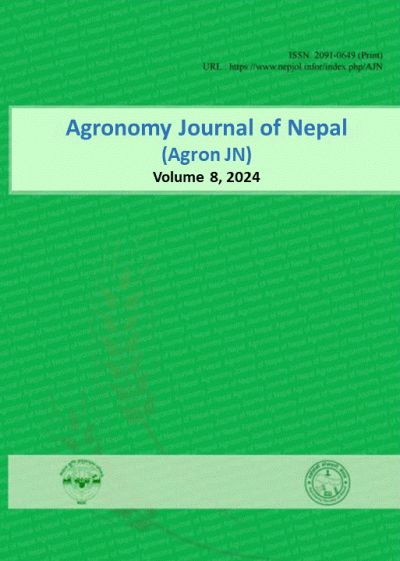Performance of Single Cross Maize Hybrids for Summer Planting in Western Nepal
DOI:
https://doi.org/10.3126/ajn.v8i1.70775Keywords:
Maize, Hybrid, Genetic diversity, YieldAbstract
In addition to being a major source of food, feed, and fodder, maize is one of the important cereals for the livelihood of hill farmers in Nepal. Low maize productivity in the western hills of Nepal has traditionally been associated with the absence of high yielding varieties. The purpose of this study was to find single cross maize hybrids that would be highly productive and adaptable for summer planting in western hills of Nepal. An alpha lattice design with three replications was used to evaluate one hundred single cross hybrids, including checks at NMRP, Rampur; DoAR, Surkhet; and DoAR, Doti during the summer season of 2019. In the evaluated maize hybrids, all measured traits showed significant genetic variation, indicating the presence of substantial genetic diversity among tested hybrids and significant genotype by environmental interaction highlighting the variable performance across locations. RML-145/RL-105, RML-97-1/RML-98, RML-145/RML-146, RML-138/RML-2, and RML-97-2/RL-105 was among the top 17 hybrids with grain yields of 8-9 t ha1. Significant correlations of grain yield with plant height, ear height, test weight, cob length, and cob diameter suggest that these are the important traits while selecting the hybrids for yield. The study also employed 20 SSR markers to explore genetic diversity of 25 inbred lines which were used for developing top yielding hybrids, grouped these inbred lines into five distinct cluster showed moderate genetic diversity, and higher yield performance of hybrids associated with diverse background of parental lines. The genotype by environment interactions highlights the importance of multilocation testing to ensure consistent or location specific performance across varied conditions. The results suggest the possibility of exploring high yielding, adaptive, and location specific hybrids that can help to enhance maize productivity of western Nepal and narrow down the yield gap.
Downloads
Downloads
Published
How to Cite
Issue
Section
License
Copyright (c) 2024 Agronomy Society of Nepal (ASoN)

This work is licensed under a Creative Commons Attribution-NonCommercial 4.0 International License.
ASON permits for free use, distribution and reproduction in any medium if the original work is properly cited and not used for commercial purposes.




